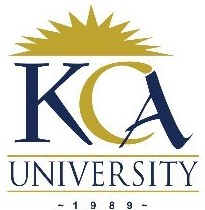 UNIVERSITY EXAMINATIONS: 2013/2014
UNIVERSITY EXAMINATIONS: 2013/2014
ORDINARY EXAMINATION FOR THE BACHELOR OF SCIENCE
IN INFORMATION TECHNOLOGY
BIT 2311 NETWORK SYSTEMS DESIGN AND MANAGEMENT
DATE: AUGUST, 2014 TIME: 2 HOURS
INSTRUCTIONS: Answer Question ONE and any other TWO
QUESTION ONE: 30 MARKS (COMPULSORY)
a) Differentiate between LAN and WAN architectures from the perspective of the
networking technologies deployed in the design. (6 Marks)
b) Using a well labeled diagram, discuss the building block approach to network design.
(6 Marks)
c) With the help of well labeled diagrams, describe the three types of Ethernet/coaxial
cables highlighting their performance with regard to data rates, error rates and
maximum data segment. (6Marks)
d) Discuss six functional areas that constitute Network System Management.
(6 Marks)
e) When configuring a host computer to connect to the network the administrator will
require some key information. State six important pieces of information needed.
(6 Marks )
QUESTION TWO: 20 MARKS
a) Define the term “baseline” in the context of network design, stating its importance.
(2 Marks)
b) Describe the following errors during data transmission and explain how to prevent
them. (6 Marks)
i) Attenuation
ii) Crosstalk
c) Suppose you were the network administrator of company ZYZ which has about two
hundred PCs and you want to choose a Network Operating System (NOS) for it.
Required:
i) Describe what a NOS is. (2 Marks)
ii) Discuss five factors that you would consider when choosing the NOS.
(5 Marks)
iii) Discuss the suitability of Linux as your NOS of choice for company XYZ.
(5 Marks)
QUESTION THREE: 20 MARKS
a) Giving examples differentiate between logical and physical network topologies.
(2 Marks)
b) With the help a diagram describe the star-wired topology. (3 Marks)
c) Identify three physical characteristics of fibre optic cable that make it more suitable
for high speed digital transmission than copper cables. (3 Marks)
d) Describe the following networking devices, highlighting in which layer of the OSI
reference model they function in. (6 Marks)
i) Switch
ii) Router
iii) Repeater
e) As a network designer you are expected to be able to carry out a feasibility study in
order to establish the worthiness of the proposed network. Discuss four feasibility
studies that you should consider. (6 Marks)
QUESTION FOUR: 20 MARKS
a) Differentiate between static routing and dynamic routing (4 Marks)
b) Discuss five skills that a network systems administrator should posses. (5 Marks)
c) Discuss five network management requirements/goals (5 Marks)
d) Describe the Simple Network Management Protocol (SNMP) highlighting its
components. (3 Marks)
e) Discuss the following form signal transmission (3 Marks)
i) Simple transmission
ii) Half duplex
iii) Full duplex
QUESTION FIVE: 20 MARKS
Imagine you are a consultant being asked to provide advice on the design of a new
network. A company is moving onto a new industrial estate and will be taking over the
use of three buildings (A, B and C). The buildings are only 40 metres apart and the
company is aware that a network of underground cable ducts exists linking the three
buildings. All the buildings only have one floor and each measure about 50 metres by 20
metres. The company will be operating several web servers which are intended to be
accessible from external locations by customers.
Building A contains the company’s main computer room which holds the web servers and
also contains several database and fileservers used by the company’s staff. The building
also contains the offices of some development staff who have very high performance
desktop computers. Their computers interactively exchange large amounts of data with
some of the servers.
Building B contains the office of the clerical staff. They have relatively low performance
desktop computers and their desks are in fixed locations. The workers only exchange a
small amount of data with the servers.
Building C contains the staff cafe and a lounge area. There are also areas used to
welcome customers. Much of the building is open plan and the furniture is regularly
moved around.
Required:
a) What type of networking should be installed in building A and what equipment or
other facilities would you need? (5 Marks)
b) What type of networking should be installed in building B and what equipment or
other facilities would you need? (5 Marks)
c) What type of networking should be installed in building C and what equipment or
other facilities would you need? How will you try to provide internet access for
visiting customers without compromising the safety of the company’s own
computers? (5 Marks)
d) What type of networking and equipment should be used to link together the three
buildings and how will overall Internet access be provided for the company?
(5 Marks)